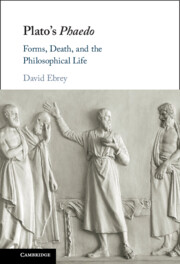Book contents
- Plato’s Phaedo
- Plato’s Phaedo
- Copyright page
- Dedication
- Contents
- Acknowledgments
- Introduction
- 1 The Characters
- 2 The Phaedo as an Alternative to Tragedy and Socrates as a Poet
- 3 Defense of the Desire to Be Dead
- 4 Cebes’ Challenge and the Cyclical Argument
- 5 The Recollecting Argument
- 6 The Kinship Argument
- 7 The Return to the Defense
- 8 Misology and the Soul as a harmonia
- 9 Socrates’ Autobiography
- 10 Cebes’ Objection and the Final Argument
- 11 The Cosmos and the Afterlife
- 12 The Death Scene
- Bibliography
- Index Locorum
- Index
1 - The Characters
Published online by Cambridge University Press: 02 February 2023
- Plato’s Phaedo
- Plato’s Phaedo
- Copyright page
- Dedication
- Contents
- Acknowledgments
- Introduction
- 1 The Characters
- 2 The Phaedo as an Alternative to Tragedy and Socrates as a Poet
- 3 Defense of the Desire to Be Dead
- 4 Cebes’ Challenge and the Cyclical Argument
- 5 The Recollecting Argument
- 6 The Kinship Argument
- 7 The Return to the Defense
- 8 Misology and the Soul as a harmonia
- 9 Socrates’ Autobiography
- 10 Cebes’ Objection and the Final Argument
- 11 The Cosmos and the Afterlife
- 12 The Death Scene
- Bibliography
- Index Locorum
- Index
Summary
The Phaedo portrays Socrates in a long discussion with members of his inner circle, which leads the dialogue to portray a very different sort of conversation from those found in most of Plato’s other dialogues. The chapter begins by considering why Plato makes Phaedo the narrator of such a significant event: the death of Socrates. The chapter also discusses Socrates’ main interlocutors, Simmias and Cebes. I argue that both are skilled, both make mistakes, and both need to be cautious lest they fall into misology. They are sympathetic to a variety of Pythagorean and Orphic ideas, but are by no means committed followers of Philolaus, a Pythagorean. The end of the chapter turns to the portrayal of Socrates, arguing that Socrates seeks not to be treated as an authority and that the Phaedo presents Socrates’ questions and views as naturally emerging from those in the Socratic dialogues.
- Type
- Chapter
- Information
- Plato's PhaedoForms, Death, and the Philosophical Life, pp. 12 - 27Publisher: Cambridge University PressPrint publication year: 2023

